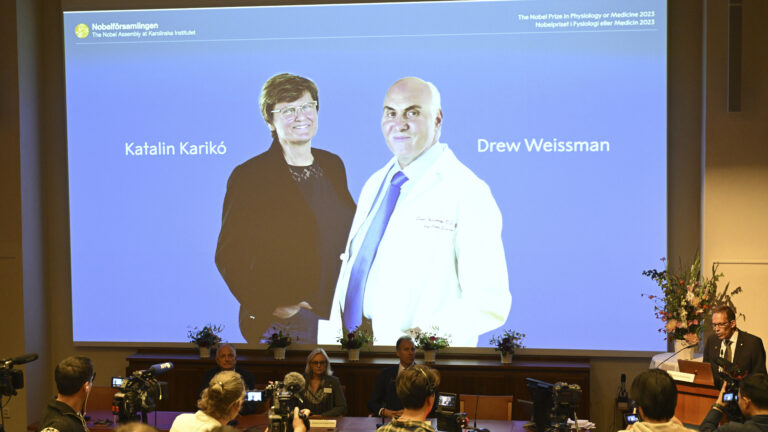On Thursday and Friday, the Centers for Disease Control and Prevention held a meeting of its Advisory Committee on Immunization Practices, a key panel that gives the CDC’s director guidance about what vaccines to recommend to the public.
The panel, in the end, postponed its most controversial vote and made recommendations that seemed aimed at fostering doubts about the Covid-19 vaccines while still keeping them widely available. But some presenters and panelists raised concerns that the mRNA Covid vaccines – the ones made by Moderna and Pfizer/BioNTech – may have unconfirmed safety issues.
In particular, Retsef Levi, who chairs ACIP’s working group on Covid vaccines, raised concerns that mRNA, the lipid nanoparticles they are encapsulated in, and the spike protein the vaccines produce may all persist and be widely distributed in the body. He also said they may provoke an immune response that is not understood and could even change the way the body reads its own genetic material. Moderna and Pfizer said that the claims were refuted by well-done studies that met global regulatory standards.
STAT posed questions about these claims to Drew Weissman, a professor at the University of Pennsylvania and co-recipient of the 2023 Nobel Prize in Physiology and Medicine for his discoveries that enabled the creation of mRNA-based Covid-19 vaccines. That conversation, edited for length and clarity, follows.
At the ACIP meeting, there were a lot of discussions about reports of mRNA being widely distributed in the body or persisting.
If you look in the literature you can find papers that say that the earth is flat, you can find papers that say DNA isn’t double stranded. You can find anything. The problem is there’s thousands, tens of thousands, hundreds of thousands, millions of other papers that refute that.

How do we know mRNA vaccines are safe and effective? An explainer
What these people do, is that they search, they find one paper or two papers that make an outlandish claim based on bad data that hundreds or thousands or tens of thousands of other papers refute, they don’t mention everything that refutes it. They only mention, oh, look, I found a paper that says spike is around for nine months! It’s just not true.
Many good studies have not seen that. The RNA is gone in days. It doesn’t go to the brain. It doesn’t go to the eyes. What those studies did is they put huge doses of RNA into a mouse and used very sensitive assays, and that’s where it went. It goes everywhere. If you put a vaccine equivalent dose, you see it in the muscle, you see it in the draining lymph node, and that’s about it.
But how certain are we that mRNA is not continuing to produce spike protein? For instance, the preprint authored by Akiko Iwasaki, which includes well respected Yale researchers. That’s a paper that found at least residual spike protein.
The problem is they used a bad assay to measure spike. It’s an ultra, ultra-sensitive assay, but it makes a lot of errors, and you don’t believe anything unless it’s above a certain level as real. What they reported was in the unknown area where it could just be noise in the assay versus real spike. Many other assays using good experiments, using good assays, don’t find spike protein circulating.
(In late August, Iwasaki told STAT: “We have already done two different orthogonal approaches to measure spike proteins thus far but are now working on developing more sensitive and accurate methods to further validate our findings.”)
How sure are you? How sure are you that there is no case of mRNA being distributed more widely in the body?
I know it’s not distributed widely. I mean, we showed that back in 2017 at vaccine doses. We’ve looked at mice, we’ve looked at macaques, we’ve looked at rabbits, and we’ve done as much as we could on humans at a vaccine dose. You don’t see RNA circulating in the placenta, in the testes, in the heart, in the eye, in the brain, all the places that they list. We and many others have looked and we just don’t see it.
And the mRNA could not be persistent? Could one dose of mRNA continue to make spike protein for months in a rare patient?

2023 Nobel Prize in Medicine: Karikó, Weissman awarded prize for mRNA research
It is absolutely impossible. MRNA is degraded incredibly rapidly. When you modify it, it’s a little slower. It’ll last 24 hours. It never, ever lasts six months. That’s just impossible. But I can make an assay that gives you any answer you want, and that’s what these people have done.
I’d like to read specifically from the concerns about mRNA vaccines made by Dr. Retsef Levi, the chair of the working group for ACIP. We covered his concern about “wide biodistribution and prolonged persistence of spike, mRNA and nano-lipid particles.” He also wrote that there are prolonged immune responses that are not understood.
In people who are vaccinated, it was incredibly rare to see that. It was mostly immunized mice. You can always find people who react differently. You can always find people who don’t respond, for instance.
Another concern is a “frame shift leading to production of unintended proteins and related immune response,” meaning the vaccine has changed the way that DNA is read to make proteins.
That was one paper that claimed that uridine caused a frameshift mutation and induced immune responses. It was never seen in thousands and thousands of other studies.
What about the issue of DNA contamination — that DNA impurities are present at too high a level and that the lipoprotein that allows the mRNA to get into cells could lead to them being taken up?
Just about every vaccine has DNA contamination. If it is made from eggs, if it is made from living cells, if it is an inactivated virus, if it’s a live virus. They’re all grown in cells and cells have DNA. So when you purify the virus, you get very low levels of DNA contamination. We’ve never seen an adverse event.
And these are minute amounts. For mRNA, the DNA strands are a couple of nucleotides long. We’ve never seen them integrate into the chromosomes or cause cancer, it just hasn’t been seen. People give a milligram dose of DNA plasmid as a vaccine, it’s in clinical trials right now. We don’t see any adverse events from that.
Is there anything else you’d like to say?
What concerned me more from these meetings is they voted against combined childhood vaccines. They voted against making Covid-19 vaccines available to larger populations. They’re going to likely vote against giving hepatitis B vaccines to infants.
So if you look back at the data, 250 years ago, 40% of kids never made it to adulthood. Today, it’s 4%. The majority of that decrease is due to vaccines. Vaccines have saved more lives than any other type of medical intervention, including antibiotics, including everything. Vaccines have saved an enormous number of lives.
No vaccine was tested more extensively than the RNA vaccines, and no vaccine was given to more people than the mRNA vaccines, and they were found to be incredibly safe, safer than any other vaccine platform and effective. They saved 20 million lives, and they stopped a pandemic that was shutting down the world.

